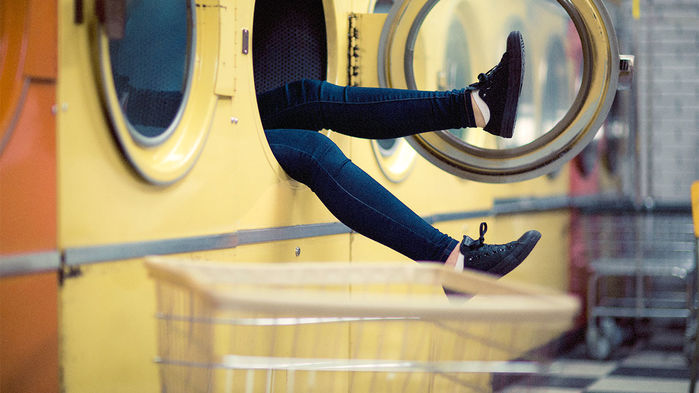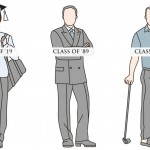By Adam Ruben
Science, May 17, 2017 —

(Nik MacMillan)
Sometimes I’m asked to blurb a book. This is fun, because I get to read a book—and also because I get to say that I’m “blurbing,” which makes me feel like some kind of squid.
The last two books I’ve blurbed have both aimed to teach grad students and postdocs how to find jobs. (They’re The Professor Is In and ReSearch: A Career Guide for Scientists, and I recommend both.) I was especially interested to see that both contained the same instruction, and it was one that I’d somehow never encountered before. It was a suggestion to help grad students and postdocs appear more professional: Stop acting like grad students and postdocs.
ReSearch, for example, offers six rules for finding a successful career in science. Rule number one is “Trainees do not get hired.” The book warns that if you see yourself as a student, and you display your student-like informality and antisocial habits, the professional world may not take you seriously. A general professional demeanor, the book reminds the reader, “is not something that is expected always of a student in the laboratory but it is something expected of a faculty member, industry professional, and leader in the bioscience community.”
In other words, when you interview for a job and you act like a grad student—which is to say, a tired, introverted schlub—your prospective employer will view you as a permanent grad student, not a potential colleague.
It’s intuitive enough advice, and you’ve probably heard variations of it before: Dress more formally for a job interview than for a late night in the lab. Be confident and authoritative. Sound like you know what you’re talking about. Don’t say “I’m a postdoc studying chemistry,” say “I’m a chemist,” because you totally are a chemist, and the fact that someone wealthier is last author on all your papers doesn’t make you less of a chemist.
But something about the suggestion struck me as weird. Maybe I’m put off because it contradicts the usual “be yourself” mantra. But more than that, it feels like scolding. During your training, it’s fine to wear that hoodie you never wash, to plan your day around snagging catered sandwiches, to go nuts playing foosball in the department lounge. This informality is the tradeoff for your hard work and hey-I-can-almost-afford-cheese stipend. At that point, saying “trainees do not get hired” makes it feel like you’ve been doing it wrong that whole time.
Grad students and postdocs are already the long-suffering subjects of jokes about wasted time and talent. But there has always been something admirable about their dedication to scholarship. Now we’re telling them that their very gestalt is a detriment to their job prospects?
Here’s a thought: Maybe professionals should act more like grad students and postdocs. Maybe those with nice shoes and savings accounts should emulate a few of the assets of the trainees they once were.
In my first year of grad school, for instance, I did a 2-month rotation at what might be considered a “normal” company. (My graduate department was extraordinarily progressive in this regard, but I think they ended up regretting their decision when we had to say things like, “Um, I can’t tell you what the results were, because that’s proprietary” in our rotation talks.)
At 5 p.m. one day, when literally everyone else in the lab was about to zip out the door, I realized that I hadn’t yet reached the overnight incubation step for the experiment I was working on. All I had to do was another hour’s worth of work. It made sense. Stay an extra hour; save a day.
But my labmates found this suggestion confusing and blasphemous. “You want to stay past 5 o’clock?” they asked. “Why? Why don’t you just do it tomorrow? It’s, like, 5 o’clock.”
I ended up—and this is true—having to go to the security office to specially register my badge for permission to stay late. That’s how infrequently employees at that company stayed past 5 o’clock.
I’d say that staying beyond the mythical witching hour of 5:01 p.m. that day was acting like a grad student—in a good way. Devotion, flexibility, and hard work come in packages of all shapes, and they are worth celebrating even when they’re a little rough around the edges.
But I suppose the authors have a point. A workplace full of grad students and postdocs carries its own challenges. Can you imagine the meetings at a company like that?
Welcome, everyone. Before we begin, I’d like to go around the conference table—wake up, please—I’d like to go around the conference table and see if we have any new complaints about our bosses. Yes? Ah, “yells at me and doesn’t know how to use computers.” A classic.
Yes, the bagels are coming.
So let’s start with payroll. I trust you’re all receiving your pennies and dust. Now I’d like to talk about health insurance and 401(k) matching contributions. Just kidding!
Next, let’s get an update on our first-quarter projections. Can someone please plug in the laptop covered with bumper stickers of nerdy chemistry jokes and Scotch-taped printouts of web comics? Thanks. There’s a graph here that shows our year-to-date progress, but since none of us probably feel like looking at it, let’s look for pirated Doctor Who episodes on YouTube, and we’ll totally talk about the graph later.
Okay, the bagels are here.
And now the bagels have all been taken. Please, people, remember that it’s one bagel per person, plus 10 per Tupperware.
Finally, on to budgetary concerns—ooh, yes, that’s a great suggestion. Let’s buy a pinball machine. Done.
Were we supposed to talk about that graph? Oops. We’ll totally talk about it next time.
We will now adjourn until the next meeting, which will be at midnight. That’s a ridiculous question; of course there will be pastries.
So yes, I understand where the authors are coming from. A slightly heightened level of professionalism has its value (though I’ll be the first to acknowledge that I still sometimes act like a grad student, and not always in a good way).
Maybe I’m just upset that no one gave me this particular piece of advice when I was on the job market. I don’t remember whether I changed my own mannerisms when I was interviewing. I do remember wearing a tie and non-sneakers, then looking in the mirror and concluding that I looked like I was playing dress-up with my dad’s clothes.
My point is, if you heed the authors’ recommendation to stop acting like a trainee, remember that—while it makes sense to consider your attitude and self-assurance—you shouldn’t lose the qualities that make science trainees so awesome in the first place. Besides, sometimes grad students and postdocs will be grad students and postdocs, regardless of how much ink you spill to warn them that their obsessive proclivities are a turnoff.
Trust me, I know a lot about ink. I’m a squid.












